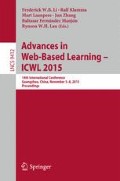Abstract
Even without rigorous empirical research, we know that some teachers are more effective in their teaching approaches than others. We can hypothesise that part of their success can be attributed to the pedagogical methods or scenarios they use, and that these scenarios could also be re-used by other teachers. But it is quite complicated to describe good teaching practices, methods and approaches so that these can easily be adopted by other teachers. Today, several different tools and methods exist for describing and sharing effective pedagogical scenarios, but their biggest disadvantage is a low rate of acceptance among teachers. The paper provides an overview of the state of the art in the domain of software tools for building and sharing pedagogical scenarios, using a two-dimensional analytic framework. As an outcome of this analysis, design guidelines for an alternative scenario-building tool are proposed.
Access this chapter
Tax calculation will be finalised at checkout
Purchases are for personal use only
References
Schneider, D., Synteta, P., Frété, C., Girardin, F., Morand, S.: Conception and implementation of rich pedagogical scenarios through collaborative portal sites: clear focus and fuzzy edges. In: International Conference on Open and Online Learning, University of Mauritius (2003)
Illeris, K.: Towards a contemporary and comprehensive theory of learning. Int. J. Lifelong Educ. 22(4), 396–406 (2003)
Churches, A.: 21st century pedagogy (2008). http://edorigami.edublogs.org/2008/08/16/21st-century-pedagogy/. Accessed 10 July 2015
Bingimlas, K.: Barriers to the successful integration of ICT in teaching and learning environments: a review of the literature. EURASIA J. Math. Sci. Technol. Educ. 5(3), 235–245 (2009)
Le Fevre, D.: Barriers to implementing pedagogical change: the role of teachers’ perceptions of risk. Teach. Teacher Educ. 38, 56–64 (2014)
Conole, G., Fill, K.: A learning design toolkit to create pedagogically effective learning activities. J. Interact. Media Educ. 8, 1–16 (2005)
Häkkinen, P., Mäkitalo-Siegl, K.: Educational perspectives on scripting CSCL. Scripting Comput. Support. Collaborative Learn. 6, 263–271 (2007)
Saettler, P.: The Evolution of American Educational Technology. IAP, Charlotte (1990)
Choi, S.: Application of component display theory in designing and developing CALI. CALICO J. 3(4), 40–45 (1986)
Dillenbourg, P., Tchounikine, P.: Flexibility in macro-scripts for CSCL. J. Comput. Assist. Learn. 23(1), 1–13 (2007)
Dillenbourg, P.: Over-scripting CSCL: the risks of blending collaborative learning with instructional design. In: Kirschner, P.A. (ed.) Three worlds of CSCL. Can we support CSCL, pp. 61–91. Open Universiteit Nederland, Heerlen (2002)
iTEC Scenarios: (2013) http://itec.aalto.fi/. Accessed 10 July 2015
Toikkanen, T., Keune, A.: Designing Edukata: a method for educators to create learner centered activities. In: Proceedings of WCEMT 2014, pp. 1476–1483 (2014)
Caeiro, M., Anido, L., Llamas, M.: A critical analysis of IMS learning design. In: Wasson, B., Ludvigsen, S., Hoppe, U. (eds.) Designing for Change in Networked Learning Environments, vol. 2, pp. 363–367. Springer, Netherlands (2003)
Dalziel, J.: Lessons from LAMS for IMS learning design. In: Sixth International Conference on Advanced Learning Technologies, pp. 1101–1102 (2006)
Bower, M., Craft, B., Laurillard, D.: Using the learning designer to develop a conceptual framework for linking learning design tools and systems. In: International LAMS and learning Design Conference, pp. 61–71 (2011)
Sobreira, P., Tchounikine, P.: A model for flexibly editing CSCL scripts. Int. J. Comput. Support. Collaborative Learn. 7(4), 567–592 (2012)
Author information
Authors and Affiliations
Corresponding author
Editor information
Editors and Affiliations
Rights and permissions
Copyright information
© 2015 Springer International Publishing Switzerland
About this paper
Cite this paper
Kurvits, M., Laanpere, M., Väljataga, T. (2015). Analysis of Tools and Methods for Describing and Sharing Reusable Pedagogical Scenarios. In: Li, F., Klamma, R., Laanpere, M., Zhang, J., Manjón, B., Lau, R. (eds) Advances in Web-Based Learning -- ICWL 2015. ICWL 2015. Lecture Notes in Computer Science(), vol 9412. Springer, Cham. https://doi.org/10.1007/978-3-319-25515-6_24
Download citation
DOI: https://doi.org/10.1007/978-3-319-25515-6_24
Published:
Publisher Name: Springer, Cham
Print ISBN: 978-3-319-25514-9
Online ISBN: 978-3-319-25515-6
eBook Packages: Computer ScienceComputer Science (R0)

